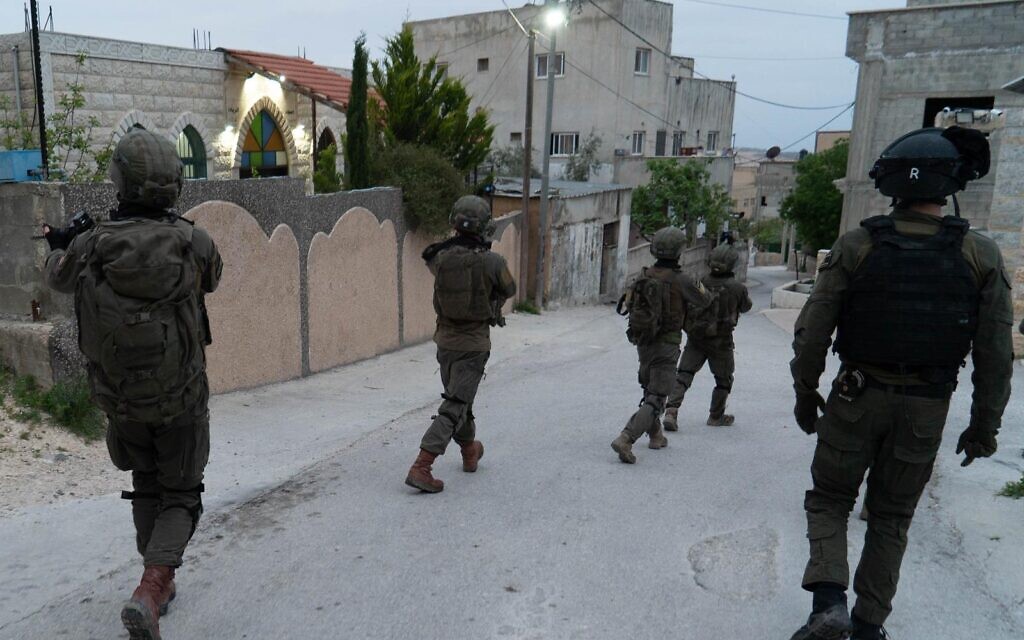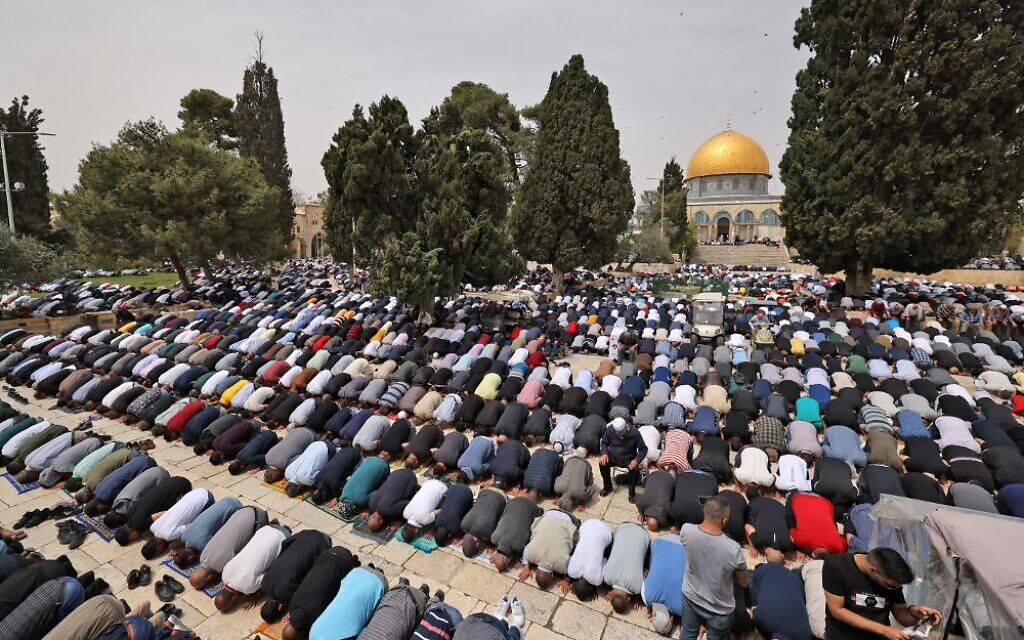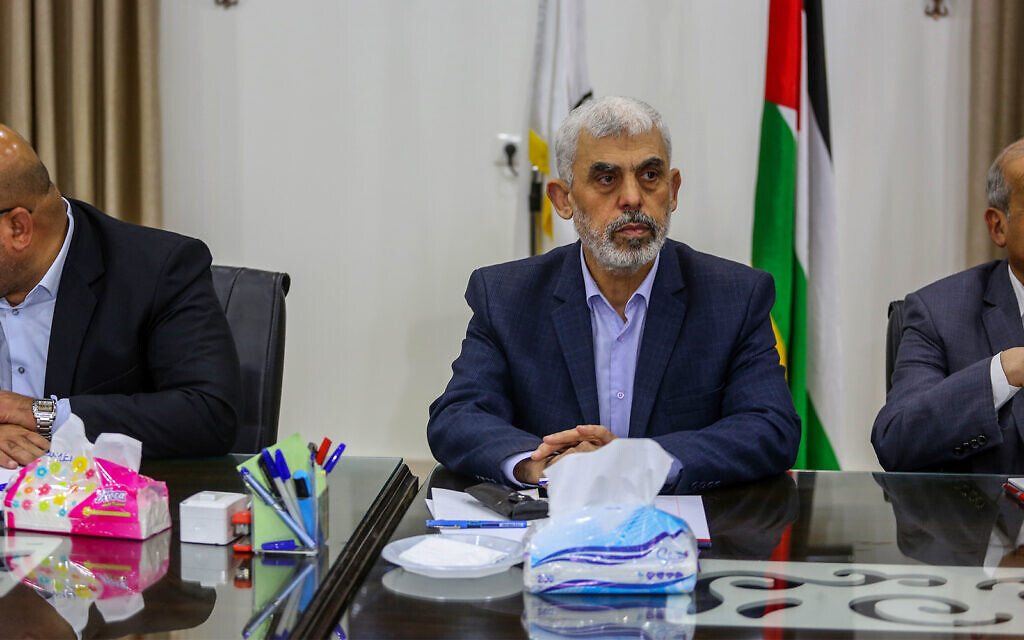Clashes broke out between Palestinians and Israeli police at the Temple Mount early Friday morning, as spiking tensions, threats of terror and the observance of major holidays all converge around the flashpoint holy site.
Skirmishes between police and worshipers at the site were reported around 6:30 a.m., with officers entering the compound and clashing with people barricaded inside.
Police said in a statement that at around 4 a.m., dozens of young people began marching in the area, carrying flags of both the Palestinian Liberation Organization and the Gaza-ruling Hamas terror group.
The marchers threw stones and fireworks, while stockpiling rocks and other objects to prepare for further clashes, according to police.
Police said they waited for morning prayers to end before entering the Temple Mount to disperse the rioters, and that some of them threw stones at the Western Wall below.
According to police, some Palestinians barricaded themselves inside the Al-Aqsa Mosque, from where they hurled stones toward officers. The police statement said the rioting was preventing prayers at the mosque and “thus harming a large number of Muslims” seeking to worship there.
Police said three officers were lightly hurt after being pelted with stones, two of whom required medical treatment.
The Palestinian Red Crescent emergency group reported 67 people were injured in the clashes.
Police released video from the scene.
Israel’s Foreign Ministry released a statement clarifying officers did not enter the Al-Aqsa Mosque, the third holiest site in Islam. The Temple Mount is the holiest place in Judaism.
“Masked men hurl stones and set off fireworks, desecrating Al-Aqsa Mosque,” it said. “Contrary to FAKE reports, police forces DID NOT enter the mosque.”
Masked men hurl stones and set off fireworks, desecrating Al-Aqsa Mosque.
Contrary to FAKE reports, police forces DID NOT enter the mosque. pic.twitter.com/IaXnXbcDts
— Israel Foreign Ministry (@IsraelMFA) April 15, 2022
A Hamas spokesperson said the terror group “strongly condemns the brutal attacks by the Israeli occupation soldiers against worshipers in the blessed Al-Aqsa Mosque.”
The statement added that Israel “bears full responsibility for the consequences of the attacks.”
Fears of violence were already sky-high before the Friday morning scuffles.
This Friday is the second during the Muslim holy month of Ramadan, the first night of Judaism’s weeklong Passover holiday and Good Friday, when Christians commemorate the crucifixion of Jesus Christ
At the same time, a series of deadly terror attacks in Israel in recent weeks has killed 14 and left Israel reeling. The attacks have prompted countermeasures from Israeli security forces across the West Bank, including arrests that have spilled into violence.
Hamas called for an escalation against Israel on Thursday and urged “hundreds of thousands” to attend Friday prayers in Jerusalem, further stoking fears of conflict.
Thousands of police officers and hundreds of soldiers have been sent to the capital to boost security on streets and crowded places. Security forces have warned of attempts to carry out further attacks and have been working to close gaps in the separation barrier between Israel and the West Bank.

Palestinians burn tires as they block the streets leading to Joseph’s Tomb, near Balata refugee camp, in the West Bank city of Nablus, April 11, 2022. (Nasser Ishtayeh/Flash90)
The Border Police’s head of operations, Oded Aflalo, told Ynet on Thursday that the force’s troops were at their highest alert.
“Today is the day we’re at our peak for preparations ahead of Seder night, combined with prayers on Friday for Ramadan,” he said, referring to the traditional dinner on the first night of Passover. “All possible scenarios are on the table, from the level of a threatening individual to a terrorist cell from a terror organization.”
He said Border Police were working to find Palestinians who were already in Israel illegally.
A senior police official told Ynet that additional officers will be guarding train stations and bus stops, which are expected to be packed with travelers and soldiers returning home from base. The police official also said there will be increased security at hotels and other sites that will host large Seder dinners.
Palestinian Authority security forces are cooperating with their Israeli counterparts and most of the Palestinian public is not expected to take to the streets, Channel 12 reported.

IDF soldiers are seen operating in the West Bank on April 13, 2022. (Israel Defense Forces)
A senior security official told Channel 12 that an outbreak of violence could drag Israel into another round of Gaza fighting like last year’s war with Hamas.
“If there is an escalation tomorrow and there are casualties, we may get to Operation Guardian of the Walls round two,” he said, referring to the 2021 conflict.
Ramadan is typically a period of high tension, as tens of thousands of worshipers, including many West Bank Palestinians, attend services at Al-Aqsa Mosque, which sits atop the Temple Mount complex. The site is Judaism’s holiest place, and the mosque is Islam’s third-holiest.
The site is the emotional epicenter of the Israeli-Palestinian conflict and tensions there can easily snowball into wider conflagrations. Hamas and other Gaza-based terror groups have repeatedly invoked the flashpoint holy site as a red line. Police actions to quell riots there last year helped trigger the 11-day war in Gaza in May.

Palestinians attend afternoon prayers on the Temple Mount, which houses the Al-Aqsa Mosque, in Jerusalem’s Old City, on April 8, 2022, during the first Friday of the Muslim holy month of Ramadan. (Ahmad Gharabli/AFP)
This week, a group of Jewish extremists sent tensions soaring by publicly encouraging ritual sacrifices for Passover on the Temple Mount. Jews are allowed to visit the compound, but not pray or perform religious rituals, as part of a delicate status quo.
The Returning to the Mount extremist group, which advocates the construction of a third Jewish temple on the site that once housed the two biblical Temples, announced on Facebook on Monday that it would be offering a cash prize to those who manage to sacrifice a lamb on the Temple Mount, and to anyone arrested trying to do so.
A small group of Jewish extremists has occasionally sought to perform the Biblically mandated Passover sacrifice on the Temple Mount. Police have regularly detained the perpetrators, who do not appear to have successfully pulled off a sacrifice in recent years at the site.
This year’s would-be sacrificers’ campaign has gained enormous traction in Palestinian and Arab media following the social media post, which drew threats from Hamas and condemnation from Jordan and the Palestinian Authority. Israeli authorities vowed to stop any attempts to bring sacrificial animals to the complex, as they have in years past.
On Thursday, Hamas and other Gaza terror groups said in a joint statement, “We are declaring a general mobilization in all places where our people are located. We are calling on the masses to come out in the hundreds of thousands to protect our nation and our mosque.”

Yahya Sinwar, leader of the Hamas terror group, hosts a meeting with members of Palestinian factions, at the Hamas president’s office in Gaza City, on April 13, 2022. (Attia Muhammed/Flash90)
“We call on our people to march and go out in the hundreds of thousands to hold Friday prayers at Al-Aqsa,” the groups said.
Six Jews were arrested on Thursday morning after police suspected they were planning to sacrifice a goat at the Temple Mount ahead of Passover.
Israel has conveyed messages to Hamas that Israeli authorities will not allow Jewish extremists to hold sacrifices at the Temple Mount, Hamas official Saleh al-Arouri told Hamas media.
Al-Arouri said Hamas did not trust in Israel’s reassurances and the terror group was preparing to respond to attempts to “defile Al-Aqsa.”
Tens of thousands were already expected to attend Friday prayers at Al-Aqsa. Most of the Ramadan worshipers will cross into Israel without permits, part of a policy to loosen normally tight Israeli restrictions on Palestinian movement for the holiday. Attendance by West Bank Palestinians is limited to women, children and men over 50, as per Defense Ministry orders issued earlier this month.
Allowing in thousands of Palestinians carries a clear security risk for Israel, but clamping down on worshipers during Ramadan could spark an outbreak of violence.
In addition to the holiday friction, Israeli troops have been carrying out extensive raids in the West Bank following the deadliest outbreak of terror in Israel in years. The raids have led to violent protests in numerous West Bank communities.
At least 16 Palestinians have been killed in clashes with the IDF in the past two weeks alone, including a 17-year-old who died Friday morning of wounds sustained the day before.
A total of 18 suspects were arrested in the West Bank in the past couple of days, the IDF said on Thursday.
